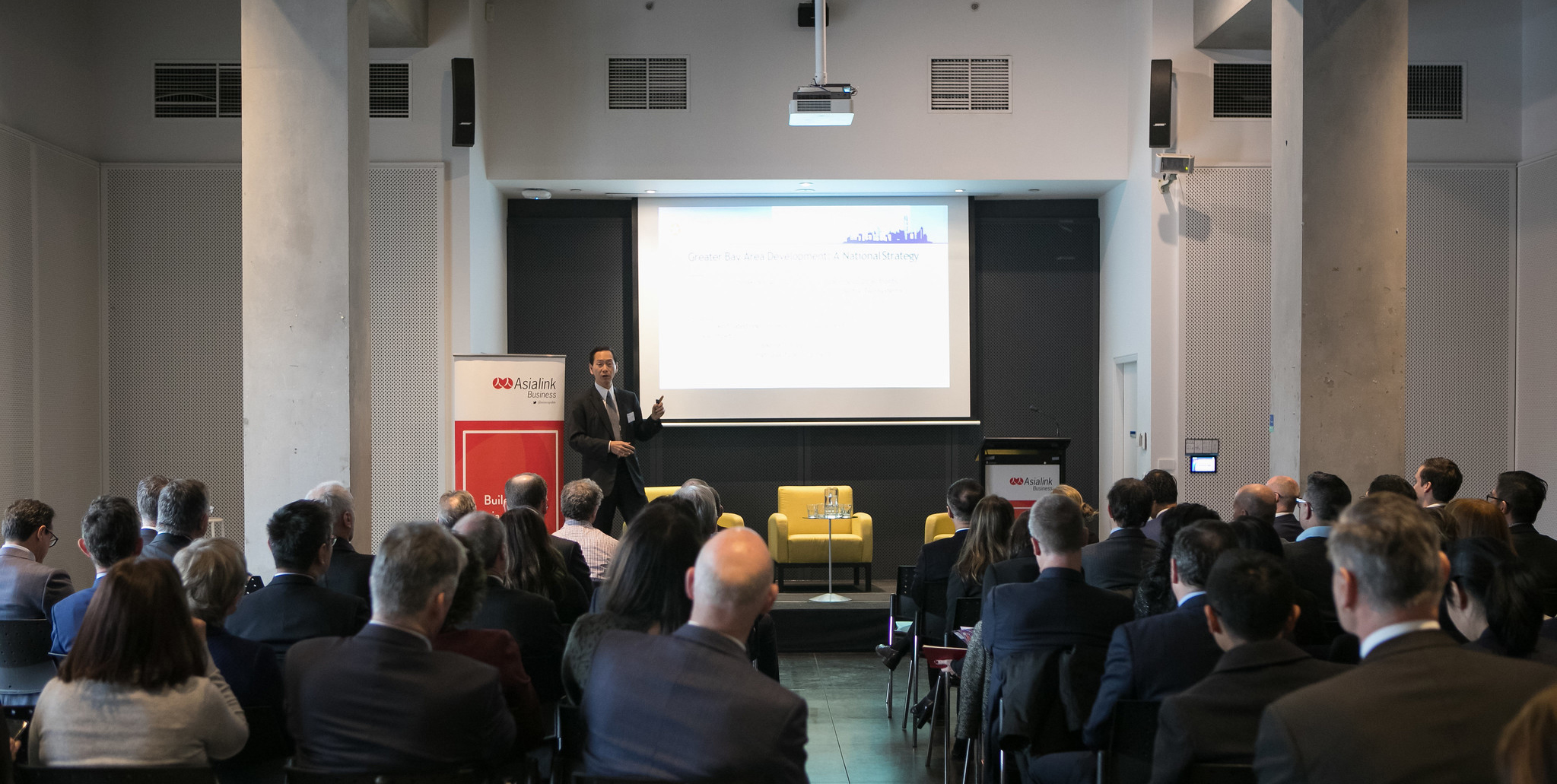Unpacking the Greater Bay Area initiative with Hong Kong’s Bernard Chan
Down by the Greater Bay – Unpacking the GBA initiative with Hong Kong’s Bernard Chan

Encompassing 71 million people, with a combined GDP of US$1.6 trillion, the Greater Bay Area, (GBA) is one of the most open and economically vibrant regions within China.
The initiative links 11 cities across the East and West of the Pearl River Delta – namely, Hong Kong, Macau, Guangzhou, Shenzhen, Zhuhai, Foshan, Zhongshan, Dongguan, Huizhou, Jiangmen and Zhaoqing – to form an integrated economic and business hub and mega “city cluster.”
As one of the most open and economically vibrant regions in China, the Greater Bay Area plays a significant strategic role in the overall development of the country. The development of the Greater Bay Area is not only a new attempt to break new ground in pursuing opening-up on all fronts in a new era, but also a further step in taking forward the practice of “one country, two systems.”’ Greater Bay Area Outline Development Plan, February 2019
The size of economic activity in the GBA may be difficult to comprehend. But it is already more than US$240 billion larger than the entire economy of Australia. In fact, by 2030, it is predicted that the economic output of the Greater Bay will surpass New York, the largest bay area in the world, as well as the Tokyo Bay area.
The scale and pace of this transformation makes understanding the GBA initiative essential for any Australian business seeking to navigate contemporary China’s economic landscape.

Speaking exclusively at an Asialink Business forum in Melbourne, Bernard Charnwut Chan, Convenor of the Hong Kong Executive Council and major business leader in the finance and insurance sectors (and one of Hong Kong Chief Executive, the Hon Carrie Lam’s closest advisors) says:
“There is a huge demand coming out of the Greater Bay Area, with its 70 million people, and rising middle class.”
The GBA’s emerging consumer classes “want access to better health care, better education and better wealth management products.”
Blueprint for connectivity
Enhanced connectivity is at the core of the GBA initiative.
Mr Chan explains that the GBA aims to promote a coordinated approach to high-quality regional development, while supporting the ongoing opening-up of China’s economy, and providing a new impetus to development in Hong Kong and Macao.
“It’s about coordinating better,” he says.
“Coordination is so important. It’s an amazing time for this whole area – The GBA is not only an economic opportunity, there is also a lot of mobility of people, and it is also about connecting into the rest of the world.”
Addressing the high-profile business audience, Mr Chan outlines the seven key elements of the GBA ‘Development Plan,’ which was formally approved by China’s State Council in February. These are:
1. Developing an international innovation and technology hub
2. Enhancing infrastructure connectivity
3. Building a globally competitive advanced manufacturing industry
4. Strengthening environment protection and conservation (green development)
5. Developing a “quality living circle” by increasing access to education and training, health and leisure, cultural institutions and social security
6. Strengthening cooperation and participating in the Belt and Road Initiative
7. Jointly developing cooperation across Guangdong, Hong Kong, and Macao
Work is already underway in all seven pillars. On infrastructure, the new Hong Kong-Zhuhai-Macau Bridge officially opened to traffic in October, 2018. The bridge is the length of 50 Sydney Harbour Bridges, and cuts the Hong Kong to Zhuhai journey from four hours to just over 30 minutes.
Hong Kong Gateway
“Hong Kong is a gateway to China and the world,” Mr Chan says, as he explains the Special Administrative Region’s unique role in the GBA.
“It is the most international city, an established financial centre, and it has existing strengths in technology and innovation.”
Under the GBA Development Plan, each of the 11 cities should seek to leverage their key strengths and advantages, rather than ‘compete’ to be the region’s innovation, fintech or advanced manufacturing hub.
Mr Chan highlights Hong Kong’s world-class international aviation hub and role as an aviation training centre, its position as a global financial centre, together with its highly skilled workforce.
In addition, within the GBA, Hong Kong is also the centre for international arbitration and dispute resolution, having a common law legal system and sizeable legal services industry.
These attributes mean “it is easy for international investors to use Hong Kong as a base within the GBA,” Mr Chan says.
Building business bridges
Hong Kong was Australia's 12th largest trading partner overall in 2018, with total two-way trade in goods and services worth $17.8 billion. Exports of Australian goods and services to Hong Kong accounted for more than $13 billion of this trade in 2018.
Australia and Hong Kong signed a new free trade agreement earlier this year, marking a significant step-up in this already substantial relationship.
Mr Chan encourages Australian businesses and investors to consider and assess the diverse opportunities in the GBA.
He suggests financial services companies may be well placed to seize opportunities, with the GBA’s consumer classes actively seeking access to wealth management, superannuation and other financial services.
Similarly, given the GBA’s focus on innovation and technology, there is a need for reputable international education providers to partner on training and skills building in fintech, AI, MedTech, robotics and other related areas.
The arts and cultural industries also offer great potential. Mr Chan notes Australia’s cultural industries are globally regarded, and there is a surging appetite from consumers in the GBA to access galleries, museums, theatre and other cultural activities.
And why is this soft power so important?
Ultimately, the GBA initiative is not just about Hong Kong into China, it’s about Hong Kong and China to the world, Mr Chan observes.
For practical information on growing your business in Hong Kong or China, download the Asialink Business Hong Kong and China Country Starter Packs. And for more on China's economic reform and opportunities in the GBA, read our China Practice Director, Nick Henderson and Research and Information Director, Luke Hurst's articles in Forge Magazine.
